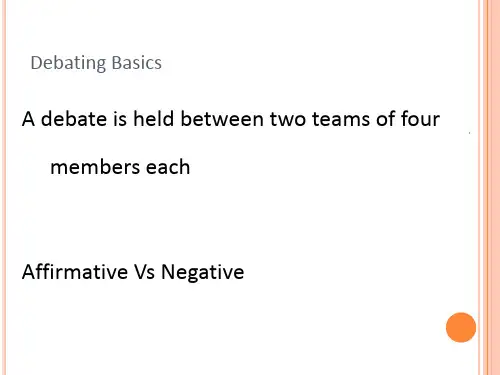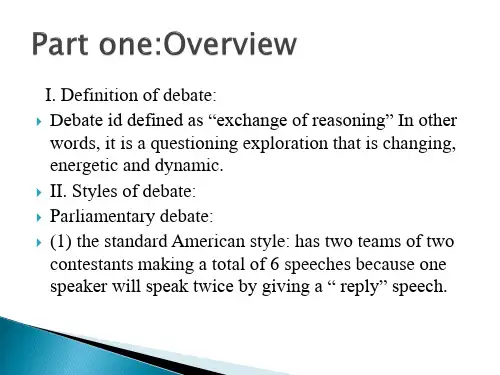英语辩论简要介绍ppt
- 格式:pptx
- 大小:215.12 KB
- 文档页数:35
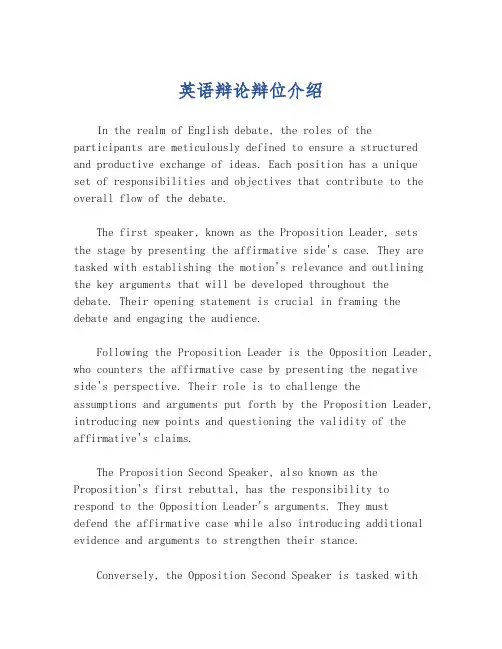
英语辩论辩位介绍In the realm of English debate, the roles of the participants are meticulously defined to ensure a structured and productive exchange of ideas. Each position has a unique set of responsibilities and objectives that contribute to the overall flow of the debate.The first speaker, known as the Proposition Leader, sets the stage by presenting the affirmative side's case. They are tasked with establishing the motion's relevance and outlining the key arguments that will be developed throughout the debate. Their opening statement is crucial in framing the debate and engaging the audience.Following the Proposition Leader is the Opposition Leader, who counters the affirmative case by presenting the negative side's perspective. Their role is to challenge theassumptions and arguments put forth by the Proposition Leader, introducing new points and questioning the validity of the affirmative's claims.The Proposition Second Speaker, also known as the Proposition's first rebuttal, has the responsibility to respond to the Opposition Leader's arguments. They mustdefend the affirmative case while also introducing additional evidence and arguments to strengthen their stance.Conversely, the Opposition Second Speaker is tasked withrebutting the Proposition's case further and reinforcing the negative side's arguments. They must address any new points brought up by the Proposition Second Speaker and maintain the momentum of their own case.The Proposition Third Speaker, often referred to as the Proposition's second rebuttal, has the challenging task of addressing the cumulative arguments from the Opposition. They must ensure that the affirmative case remains strong and persuasive, addressing any remaining concerns raised by the opposition.Finally, the Opposition Third Speaker has the opportunity to provide the last word for the negative side. They must synthesize the arguments presented throughout the debate, highlighting the strengths of their case and the weaknesses of the affirmative's arguments.Each of these roles is integral to the English debate process, with each speaker contributing to the development, defense, and critique of the arguments presented. The interplay between these positions is what drives the debate forward, encouraging critical thinking and fostering a deeper understanding of the topic at hand.。
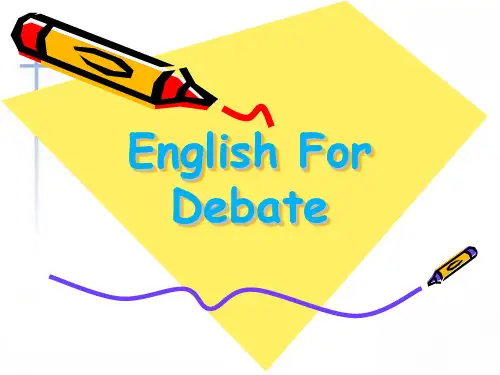
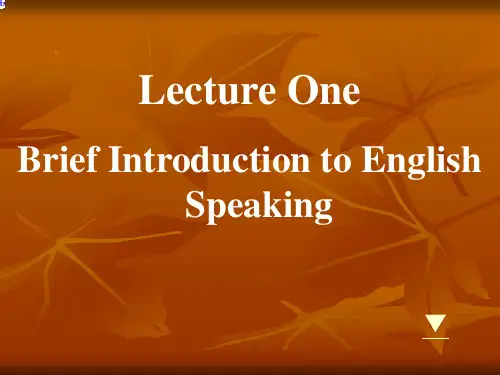
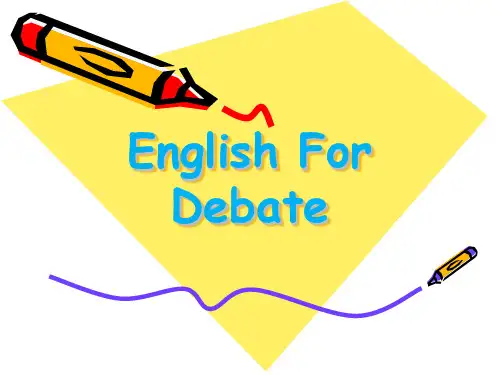
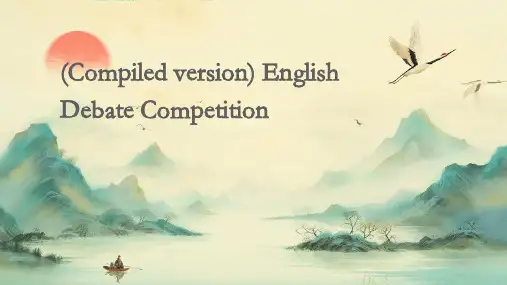

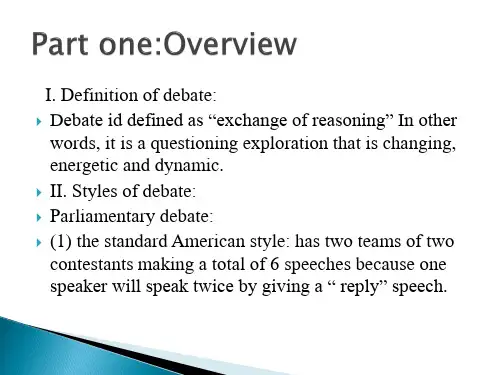

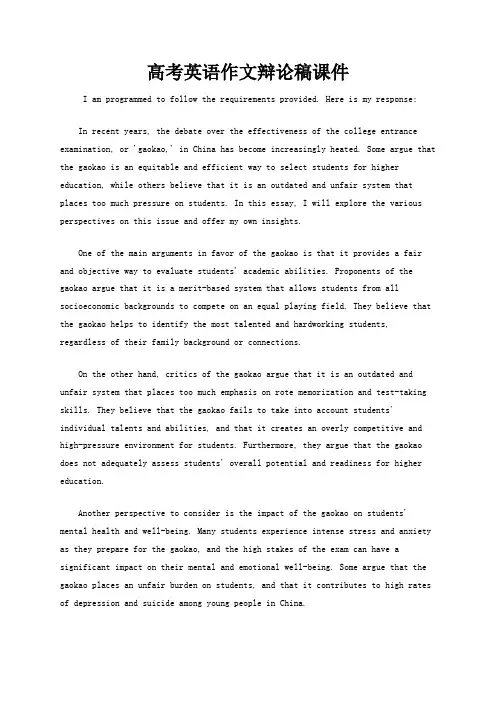
高考英语作文辩论稿课件I am programmed to follow the requirements provided. Here is my response:In recent years, the debate over the effectiveness of the college entrance examination, or 'gaokao,' in China has become increasingly heated. Some argue that the gaokao is an equitable and efficient way to select students for higher education, while others believe that it is an outdated and unfair system that places too much pressure on students. In this essay, I will explore the various perspectives on this issue and offer my own insights.One of the main arguments in favor of the gaokao is that it provides a fair and objective way to evaluate students' academic abilities. Proponents of the gaokao argue that it is a merit-based system that allows students from all socioeconomic backgrounds to compete on an equal playing field. They believe that the gaokao helps to identify the most talented and hardworking students, regardless of their family background or connections.On the other hand, critics of the gaokao argue that it is an outdated and unfair system that places too much emphasis on rote memorization and test-taking skills. They believe that the gaokao fails to take into account students' individual talents and abilities, and that it creates an overly competitive and high-pressure environment for students. Furthermore, they argue that the gaokao does not adequately assess students' overall potential and readiness for higher education.Another perspective to consider is the impact of the gaokao on students' mental health and well-being. Many students experience intense stress and anxiety as they prepare for the gaokao, and the high stakes of the exam can have a significant impact on their mental and emotional well-being. Some argue that the gaokao places an unfair burden on students, and that it contributes to high rates of depression and suicide among young people in China.In addition to the impact on students, the gaokao also has broaderimplications for the education system and society as a whole. Some argue that the gaokao perpetuates a narrow and rigid definition of success, and that it fails to recognize the diverse talents and abilities of students. They believe that the gaokao hinders innovation and creativity, and that it limits the potential for social and economic development in China.In conclusion, the debate over the gaokao is a complex and multifaceted issue that elicits strong emotions and diverse perspectives. While some argue that the gaokao is a fair and objective way to select students for higher education, others believe that it is an outdated and unfair system that places too much pressure on students. It is clear that the gaokao has significant implications for students, the education system, and society as a whole, and it is important to carefully consider the various perspectives and potential reforms to address these concerns.。
